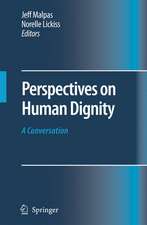Food Justice in US and Global Contexts: Bringing Theory and Practice Together: The International Library of Environmental, Agricultural and Food Ethics, cartea 24
Editat de Ian Werkheiser, Zachary Pisoen Limba Engleză Hardback – 13 iul 2017
| Toate formatele și edițiile | Preț | Express |
|---|---|---|
| Paperback (1) | 687.21 lei 39-44 zile | |
| Springer International Publishing – 2 aug 2018 | 687.21 lei 39-44 zile | |
| Hardback (1) | 697.64 lei 39-44 zile | |
| Springer International Publishing – 13 iul 2017 | 697.64 lei 39-44 zile |
Din seria The International Library of Environmental, Agricultural and Food Ethics
- 15%
 Preț: 707.96 lei
Preț: 707.96 lei -
 Preț: 451.76 lei
Preț: 451.76 lei - 18%
 Preț: 731.10 lei
Preț: 731.10 lei - 18%
 Preț: 744.53 lei
Preț: 744.53 lei - 18%
 Preț: 899.87 lei
Preț: 899.87 lei - 18%
 Preț: 1831.27 lei
Preț: 1831.27 lei - 15%
 Preț: 644.82 lei
Preț: 644.82 lei - 15%
 Preț: 643.16 lei
Preț: 643.16 lei - 18%
 Preț: 947.04 lei
Preț: 947.04 lei - 18%
 Preț: 953.20 lei
Preț: 953.20 lei - 15%
 Preț: 646.62 lei
Preț: 646.62 lei - 15%
 Preț: 646.75 lei
Preț: 646.75 lei - 18%
 Preț: 1116.40 lei
Preț: 1116.40 lei - 15%
 Preț: 643.99 lei
Preț: 643.99 lei - 18%
 Preț: 953.65 lei
Preț: 953.65 lei - 15%
 Preț: 645.28 lei
Preț: 645.28 lei - 15%
 Preț: 637.28 lei
Preț: 637.28 lei - 18%
 Preț: 786.66 lei
Preț: 786.66 lei - 15%
 Preț: 644.30 lei
Preț: 644.30 lei -
 Preț: 398.74 lei
Preț: 398.74 lei - 18%
 Preț: 902.69 lei
Preț: 902.69 lei -
 Preț: 388.52 lei
Preț: 388.52 lei - 20%
 Preț: 570.97 lei
Preț: 570.97 lei - 18%
 Preț: 784.61 lei
Preț: 784.61 lei - 15%
 Preț: 527.79 lei
Preț: 527.79 lei - 24%
 Preț: 635.52 lei
Preț: 635.52 lei - 15%
 Preț: 647.08 lei
Preț: 647.08 lei
Preț: 697.64 lei
Preț vechi: 917.95 lei
-24% Nou
Puncte Express: 1046
Preț estimativ în valută:
133.50€ • 142.75$ • 111.30£
133.50€ • 142.75$ • 111.30£
Carte tipărită la comandă
Livrare economică 14-19 aprilie
Preluare comenzi: 021 569.72.76
Specificații
ISBN-13: 9783319571737
ISBN-10: 3319571737
Pagini: 453
Ilustrații: XX, 319 p.
Dimensiuni: 155 x 235 mm
Greutate: 0.65 kg
Ediția:1st ed. 2017
Editura: Springer International Publishing
Colecția Springer
Seria The International Library of Environmental, Agricultural and Food Ethics
Locul publicării:Cham, Switzerland
ISBN-10: 3319571737
Pagini: 453
Ilustrații: XX, 319 p.
Dimensiuni: 155 x 235 mm
Greutate: 0.65 kg
Ediția:1st ed. 2017
Editura: Springer International Publishing
Colecția Springer
Seria The International Library of Environmental, Agricultural and Food Ethics
Locul publicării:Cham, Switzerland
Cuprins
Introduction to Volume: Bringing Theory and Practice Together for Food Justice (Ian Werkheiser).- Part I: Food Justice in a Global Context.- Chapter 1. Introduction to Food Justice in a Global Context (Will Schanbacher).- Chapter 2. Edible Justice: Between Food Justice and the Culinary Imaginary (David J. Leichter).- Chapter 3. Building Community Capacity in Alternative Agriculture: Lessons from the Cuban Permaculture Movement(Justine Williams).- Chapter 4. It’s Not Just About Us: Food as a Mechanism for Environmental and Social Justice in Mato Grosso, Brazil (Marisela Chavez).- Chapter 5. Save the Whale? Ecological Memory and the Human-Whale Bond in Japan’s Small Coastal Villages (Seven Mattes).- Part II: Food Justice and the Built Environment.- Chapter 6. Introduction to Food Justice and the Built Environment (Shane Epting).- Chapter 7. Food Sovereignty in the City: Challenging Historical Barriers to Food Justice (Samantha Noll).- Chapter 8. Race, Religion, and Justice: From Privilege to Solidarity in the Mid-South Food Movement (Emily Holmes).- Chapter 9. Views from the Classroom: Teachers on Food in a Low-Income Urban School District (Sarah Stapleton).- Chapter 10. Healthy Food on Wheels: An Exploration of Mobile Produce Markets (Elle Mari).- Part III: Food Justice and Governance.- Chapter 11. Introduction to Food Justice and Governance (Paul Thompson).- Chapter 12. The National Gleaning Project: The Importance of Gleaning and Food Recovery in a Sustainable and Just Food System (Amber Leasure-Earnhardt).- Chapter 13. Food, Crime, Justice and Security: (Food) Security for Whom? (Avi Brisman).- Chapter 14. Fence Posts to Blog Posts: An Exploration of the Classroom in Experiential Food Systems Education (Elissa Johnson).- Chapter 15.Institutions and Solidarity: Wild Rice Research, Relationships, and the Commodification of Knowledge (Melanie Bowman).- Part IV: Food Justice and Animal Lives.- Chapter 16. Introduction to Food Justice and Animal Lives (Lisa Heldke).-Chapter 17. Farm Forward: A Pragmatist Approach to Advocacy in Agriculture (Joseph A. Tuminello).- Chapter 18. Agriculture, Equality, and the Problem of Incorporation (Anne Portman).- Chapter 19. Religious Slaughter in Europe: Balancing Animal Welfare and Religious Freedom in a Liberal Democracy (R. W. Mittendorf).- Chapter 20. A Phenomenological Approach to Hunting, Animal Studies, and Food Justice (Jonathan McConnell).- Conclusion: Fish, Fowl, and Food Justice (Zachary Piso).
Notă biografică
Ian Werkheiser is an Assistant Professor of Philosophy at the University of Texas Rio Grande Valley (UTRGV). His work focuses on communities facing problems in their environment and food systems in a context of social and political marginalization or oppression. Prior to joining UTRGV, Ian was a founder and coordinator for the Center for Regional Food Systems’ Food Justice and Sovereignty Workgroup at Michigan State University. He has also helped organize several conferences, including Everybody Eats: Cultivating Food Democracy, a community-based conference on Michigan food issues, and the first ever Michigan Environmental Justice Coalition Statewide Summit.
Zachary Piso is a doctoral candidate in the Department of Philosophy at Michigan State University. Along with Ian Werkheiser, he organized the first four annual Workshops on Food Justice, where this volume and its chapters were conceived and developed. Zach is a transdisciplinary environmental ethicist who works with scien
tists and stakeholders to explore the values that inform environmental science, management, and policy. He is particularly focused on questions of justice that arise through the use of the social sciences to understand and manage ecosystems.
Zachary Piso is a doctoral candidate in the Department of Philosophy at Michigan State University. Along with Ian Werkheiser, he organized the first four annual Workshops on Food Justice, where this volume and its chapters were conceived and developed. Zach is a transdisciplinary environmental ethicist who works with scien
tists and stakeholders to explore the values that inform environmental science, management, and policy. He is particularly focused on questions of justice that arise through the use of the social sciences to understand and manage ecosystems.
Textul de pe ultima copertă
This book offers fresh perspectives on issues of food justice. The chapters emerged from a series of annual workshops on food justice held at Michigan State University between 2013 and 2015, which brought together a wide variety of interested people to learn from and work with each other. Food justice can be studied from such diverse perspectives as philosophy, anthropology, economics, gender and sexuality studies, geography, history, literary criticism, philosophy and sociology as well as the human dimensions of agricultural and environmental sciences. As such, interdisciplinary workshops are a much-needed vehicle to improve our understanding of the subject, which is at the center of a vibrant and growing discourse not only among academics from a wide range of disciplines but also among policy makers and community activists. The book includes their perspectives, offering a wide range of approaches to and conceptions of food justice in a variety of contexts. This invaluable work requires readers to cross boundaries and be open to new ideas based on different assumptions.
Caracteristici
Brings together scholars, policy makers and activists to discuss and model transdisciplinary collaboration in the context of food justice The first book to offer serious scholarship on the complex topic of food justice as well as practical examples of work in the area Presents contributions that emerged from a series of workshops on food justice held at Michigan State University between 2013 and 2015 Includes supplementary material: sn.pub/extras Includes supplementary material: sn.pub/extras

















